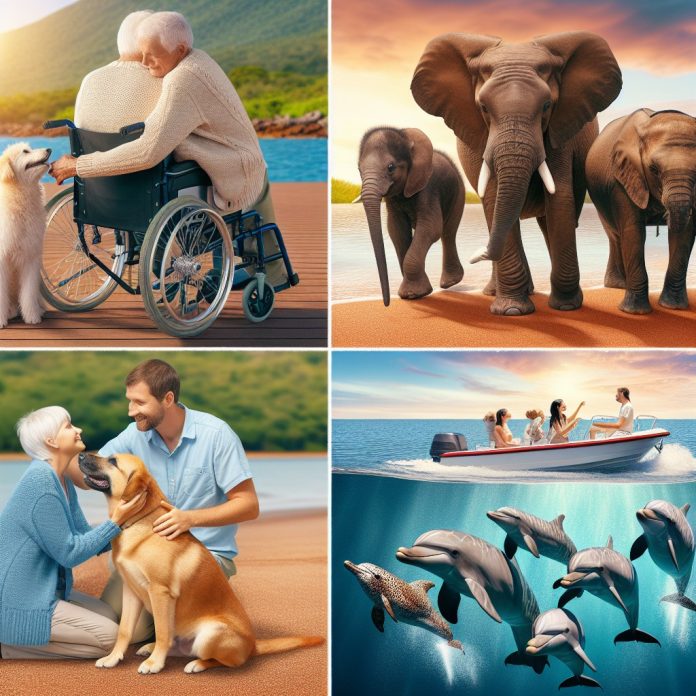
Exploring Compassionate Companions: What Kind of Animal is Caring?
Introduction:
The bond between humans and animals is a profound and enduring one, rooted in mutual affection, trust, and care. While many animals exhibit remarkable qualities of compassion and empathy, some species are renowned for their innate capacity to provide nurturing and support to others. In this comprehensive exploration, we’ll delve into the characteristics of animals known for their caring nature, shedding light on the diverse ways in which different species demonstrate compassion and empathy towards both their own kind and humans.
🐾 What Makes an Animal Caring?
Animals that are considered caring typically exhibit certain behaviors and traits that demonstrate empathy, compassion, and nurturing tendencies. Some key factors that contribute to an animal’s caring nature include:
- Social Bonds: Caring animals often form strong social bonds within their own species, engaging in cooperative behaviors, mutual grooming, and altruistic acts that promote the well-being of others in their group.
- Parental Care: Many caring animals display exceptional parental care, investing time, energy, and resources into nurturing and protecting their offspring from birth to maturity.
- Empathy: Caring animals demonstrate empathy towards others, showing sensitivity to the emotions and needs of their companions and responding with comforting gestures or supportive behaviors.
- Altruism: Some animals exhibit altruistic behaviors, sacrificing their own interests or resources to help others in need, whether within their own species or across different species.
- Communication: Caring animals use vocalizations, body language, and other forms of communication to express their emotions, convey messages, and maintain social cohesion within their group.
🐶 Types of Caring Animals:
While many animals display caring behaviors to varying degrees, some species are particularly renowned for their nurturing and compassionate nature. Here are a few examples of animals known for their caring tendencies:
- Elephants: Elephants are highly intelligent and social animals that form strong bonds within their family groups, known as herds. Female elephants, in particular, exhibit remarkable maternal care, nurturing and protecting their young for several years.
- Bonobos: Bonobos, closely related to chimpanzees, are known for their peaceful and egalitarian society, characterized by strong social bonds, cooperation, and empathy. Bonobos often use grooming and physical contact to strengthen social ties and resolve conflicts within their groups.
- Dogs: Dogs are renowned for their unwavering loyalty, affection, and devotion to their human companions. With their keen ability to interpret human emotions and respond with empathy and compassion, dogs often provide comfort and support to those in need, including individuals facing physical or emotional challenges.
- Dolphins: Dolphins are highly social and intelligent marine mammals known for their playful behavior and complex communication skills. Dolphins exhibit caring behaviors towards injured or distressed members of their pod, offering support and protection to ensure their well-being.
- Wolves: Wolves are social predators that live in close-knit family groups known as packs. Within wolf packs, individuals exhibit cooperative behaviors, mutual grooming, and caregiving roles to support the health and survival of the group as a whole.
🐾 How Do Caring Animals Benefit Humans?
The caring nature of animals has profound implications for human well-being, fostering emotional connections, promoting social cohesion, and enhancing our quality of life in various ways. Some benefits of interacting with caring animals include:
- Emotional Support: Caring animals offer unconditional love, companionship, and emotional support to humans, helping to reduce stress, anxiety, and feelings of loneliness.
- Therapeutic Benefits: Interacting with caring animals, such as therapy dogs or horses, can have therapeutic effects on individuals with physical, emotional, or cognitive challenges, promoting relaxation, socialization, and emotional healing.
- Social Interaction: Caring animals facilitate social interaction and bonding among humans, providing opportunities for connection, communication, and shared experiences within communities.
- Health and Well-Being: Studies have shown that owning pets and interacting with caring animals can have positive effects on physical health, including reduced blood pressure, improved cardiovascular health, and enhanced immune function.
- Sense of Purpose: Caring for animals instills a sense of purpose and responsibility in humans, fostering empathy, compassion, and a deeper appreciation for the interconnectedness of all living beings.
🐶 Conclusion:
The caring nature of animals serves as a powerful reminder of the inherent capacity for empathy, compassion, and nurturing that exists across the animal kingdom. From elephants and bonobos to dogs and dolphins, animals demonstrate remarkable qualities of caring and empathy towards both their own kind and humans. As we continue to explore the bond between humans and animals, it is evident that the relationships we forge with caring animals enrich our lives, deepen our understanding of empathy and compassion, and remind us of the profound interconnectedness of all living beings.



















